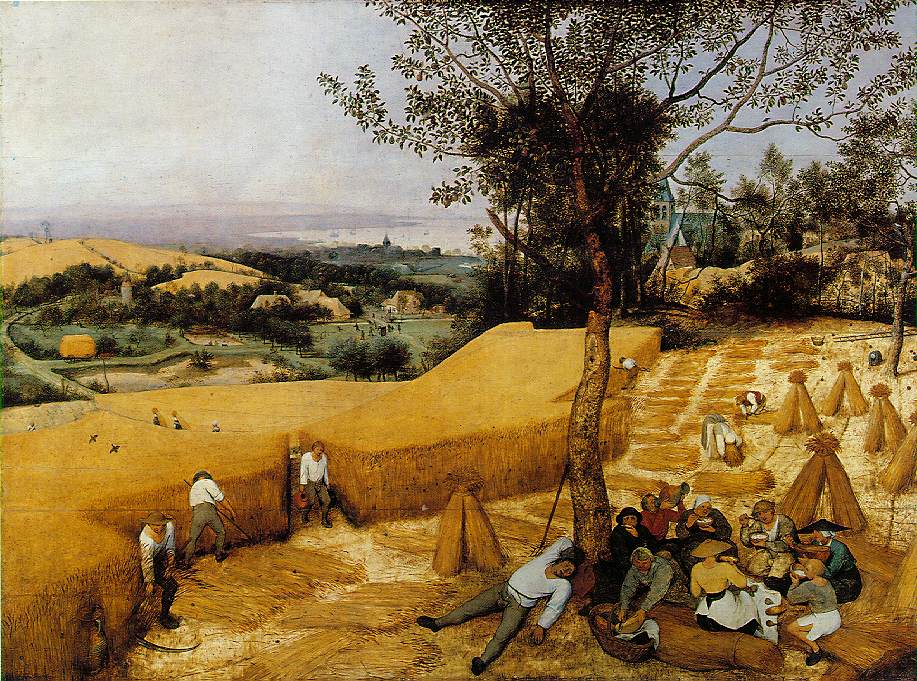THEORY

This is one of my favorite paintings at the Met. Bruegal was one of the first to recognize the sensible nature of sensible work.
Pieter Bruegal the Elder, The Harvesters, 1565 (180 Kb); Oil on wood, 118.1 x 160.7 cm (46 1/2 x 63 1/4 in); Metropolitan Museum of Art.
Sensible Work
Today is Saturday: cleaning day in our family.
It is convenient to think men and women merely have different standards of cleanliness when it comes to housework. While this may be partially the case, it is certainly not the entire reason why men do not help out around the house. Many men in Western context think of themselves primarily as players, that is, not workers. We are often most concerned with how we can get ahead, how we can accomplish our goals, with “having it made” (in the shade, if you like) as both a winner and as a consumer. In terms of nature we are primarily escapist, we spend much of our time considering ways we can better exploit it while doing less work in it. The best option we can consider is that of life itself as a game, that of playing with stocks, gambling with capital (human or otherwise). Work becomes something we do in our spare time: we “work” at relationships, “work” on our golf swing, “work”-out at the gym. Life itself is characterized as a frenzied game – we are married to our jobs, we eat, breathe, sleep, are consumed in the competition with other players as to how best use/exploit the non-exceptional players on the other team. How we actually live seems completely without merit, any hovel will do. In an echo of our earliest social experiments, we form teams excluding those who are different and most importantly those who fail to serve our interests (bad investments) in winning the game. This of course plays into the way we run our religion. Winning souls and ultimately winning at the game for heaven – the ultimate “dream” home with no maintenance – takes priority over listening to and really helping those who are in need around us. Because players are detached from nature and from others (who may stop us from winning), we know little about the sanctifying rhythms of work and rest – building conscious awareness of self and others, nature and Spirit. As we think of work in the context of setting up a home, I think we must consider living without a relationship to the natural environment as not-really living as a true human subject. What could be more real, more authentic than that which we can taste, touch, smell, see and hear?
I believe “housework,” done with one’s own hands, promotes the cultivation of natural sensibilities. As such, it aids in the development of aesthetics that embodies the Spirit of which we are made. By learning housework, children and adults accept responsibility for the way in which they order their material reality. By becoming critically aware via this process, they are far more likely to reject the prefabricated and simulated worlds produced by industry. In this way, we will begin to better appreciate and care for our environment. Because male children do not cultivate this respect they have less respect for it – rather they think via technology they can better the natural environment, or via ownership they can exploit it. As a further result most men have an unnecessary dependence on women: they cannot cook or clean for themselves (the former being the most intolerable as men have all the skills of building – just not in the kitchen). Girls are taught via the attitudes of men that such work is servile and secondary to the “important” work of constructing non-sensible worlds. These attitudes lead women to dread such work. They instead long for the day they can become a bourgeois queen (think Cinderella) and in a masculine way exploit the labor of less deserving often non-White women – while they go do the “important” work like men. In reality, the work which cultivates our sensibilities and those of others is some of the most important work we can do. If we would value such work and therefore helped in it as we should, women may begin to feel that such work affirms their identity rather than negates it.
I with Simone Weil believe that “through work a human being produces his own natural existence.” Movement toward a new human becoming will begin only when we understand that the games we play are not the essence of reality, but rather a distortion, a simulation of the natural cicumstance. Working out our sensibilities together, cultivating relations-between, in the home through the continual work of setting up a home – a process of creation, is the most basic work we can do toward refounding the family and humanity more generally. We, men, must rediscover “women’s work” as human’s work. We must stop playing games (or watching others playing games) which ignore or subjugate nature, and marginalize the female sex. We must work and rest as humans should.
(some thoughts stolen from “Crapshoot: Everyone Loses When Politics Becomes a Game,” by Garret Keizer, Feb. 2006, Harpers Magazine)

This is one of my favorite paintings at the Met. Bruegal was one of the first to recognize the sensible nature of sensible work.
Pieter Bruegal the Elder, The Harvesters, 1565 (180 Kb); Oil on wood, 118.1 x 160.7 cm (46 1/2 x 63 1/4 in); Metropolitan Museum of Art.
Sensible Work
Today is Saturday: cleaning day in our family.
It is convenient to think men and women merely have different standards of cleanliness when it comes to housework. While this may be partially the case, it is certainly not the entire reason why men do not help out around the house. Many men in Western context think of themselves primarily as players, that is, not workers. We are often most concerned with how we can get ahead, how we can accomplish our goals, with “having it made” (in the shade, if you like) as both a winner and as a consumer. In terms of nature we are primarily escapist, we spend much of our time considering ways we can better exploit it while doing less work in it. The best option we can consider is that of life itself as a game, that of playing with stocks, gambling with capital (human or otherwise). Work becomes something we do in our spare time: we “work” at relationships, “work” on our golf swing, “work”-out at the gym. Life itself is characterized as a frenzied game – we are married to our jobs, we eat, breathe, sleep, are consumed in the competition with other players as to how best use/exploit the non-exceptional players on the other team. How we actually live seems completely without merit, any hovel will do. In an echo of our earliest social experiments, we form teams excluding those who are different and most importantly those who fail to serve our interests (bad investments) in winning the game. This of course plays into the way we run our religion. Winning souls and ultimately winning at the game for heaven – the ultimate “dream” home with no maintenance – takes priority over listening to and really helping those who are in need around us. Because players are detached from nature and from others (who may stop us from winning), we know little about the sanctifying rhythms of work and rest – building conscious awareness of self and others, nature and Spirit. As we think of work in the context of setting up a home, I think we must consider living without a relationship to the natural environment as not-really living as a true human subject. What could be more real, more authentic than that which we can taste, touch, smell, see and hear?
I believe “housework,” done with one’s own hands, promotes the cultivation of natural sensibilities. As such, it aids in the development of aesthetics that embodies the Spirit of which we are made. By learning housework, children and adults accept responsibility for the way in which they order their material reality. By becoming critically aware via this process, they are far more likely to reject the prefabricated and simulated worlds produced by industry. In this way, we will begin to better appreciate and care for our environment. Because male children do not cultivate this respect they have less respect for it – rather they think via technology they can better the natural environment, or via ownership they can exploit it. As a further result most men have an unnecessary dependence on women: they cannot cook or clean for themselves (the former being the most intolerable as men have all the skills of building – just not in the kitchen). Girls are taught via the attitudes of men that such work is servile and secondary to the “important” work of constructing non-sensible worlds. These attitudes lead women to dread such work. They instead long for the day they can become a bourgeois queen (think Cinderella) and in a masculine way exploit the labor of less deserving often non-White women – while they go do the “important” work like men. In reality, the work which cultivates our sensibilities and those of others is some of the most important work we can do. If we would value such work and therefore helped in it as we should, women may begin to feel that such work affirms their identity rather than negates it.
I with Simone Weil believe that “through work a human being produces his own natural existence.” Movement toward a new human becoming will begin only when we understand that the games we play are not the essence of reality, but rather a distortion, a simulation of the natural cicumstance. Working out our sensibilities together, cultivating relations-between, in the home through the continual work of setting up a home – a process of creation, is the most basic work we can do toward refounding the family and humanity more generally. We, men, must rediscover “women’s work” as human’s work. We must stop playing games (or watching others playing games) which ignore or subjugate nature, and marginalize the female sex. We must work and rest as humans should.
(some thoughts stolen from “Crapshoot: Everyone Loses When Politics Becomes a Game,” by Garret Keizer, Feb. 2006, Harpers Magazine)



2 Comments:
Wow Darrin, a theory of... almost everything. Now if you could just bridge to string theory to explain the natural world...
Darren,
The art of being able to care for ones self is highly underestimated. We have largely lost the skills of survival by producing the goods we need to live. We are dependent on producers, processors, and merchants for the basic food items we consume.
Not only that but more and more we look for machines or lower class workers to care for our daily chores.
I agree that there are many men who feel the need for a wife, not for companionship and intimacy in relationship, as much as they feel a need for someone to do the cooking, cleaning and laundry. I recently heard of one older man who as his wife was suffering from cancer lamented, "But she can't die, who would cook for me and clean the house". I rest my case!
I am thankful for a son-in-law who is interested in sharing the duties of self care with his wife! My your attitude increase among us!
Merle
Post a Comment
<< Home